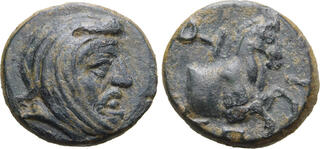| Roma Numismatics Ltd > E-Sale 115 | Auction date: 21 December 2023 |
| Lot number: 324 Price realized: 95 GBP (Approx. 120 USD / 110 EUR) Note: Prices do not include buyer's fees. | Show similar lots on CoinArchives Find similar lots in upcoming auctions on |
| Lot description: Satraps of Sparda (Achaemenid Ionia and Lydia), Spithridates Æ 11mm. Circa 334 BC. Head of satrap to right, wearing Persian headdress / Forepart of horse to right; monogram to upper left; ΣΠ-I below. Babelon, Perses 380; SNG Copenhagen 1538; SNG von Aulock 1823; Klein 367. 1.28g, 11mm, 5h. Good Very Fine; well-preserved for the type. Ex Marnix Collection, Roma Numismatics Ltd., E-Sale 78, 17 December 2020, lot 507. While under Achaemenid Persian control, the lands of Ionia and Lydia were administered together by the Satrap of Sparda, a position held by Spithridates under Darios III. Spithridates acted as a satrap of Lydia and Ionia under the rein of King Darios II. He participated as a commander for the Persian forces at the Battle of Granicus in 334 BC, the first significant battle between Alexander the Great and the Persian Empire. During this battle, Spithridates spotted an opportunity to strike Alexander. Arrian (I. 15) narrates as follows: "Alexander's spear being shattered in the conflict, he asked Aretis, one of the royal guards, whose duty it was to assist the king to mount his horse, for another spear. But this man's spear had also been broken whilst he was in the thickest of the struggle, and he was conspicuous fighting with the half of his broken spear. Showing this to Alexander, he bade him ask some one else for one. Then Demaratos, a man of Corinth, one of his personal Companions, gave him his own spear; which he had no sooner taken than seeing Mithridates, the son-in-law of Darios, riding far in front of the others, and leading with him a body of cavalry arranged like a wedge, he rode on in front of the others, and hitting at the face of Mithridates with his spear, struck him to the ground. But hereupon, Rhoesaces rode up to Alexander and struck at his head with his sword, but though it shore off a piece of his helmet, the helmet broke the force of the blow. This man too Alexander struck to the ground, striking him in the chest through the breastplate with his lance. And now Spithridates from behind had already raised aloft his sword against the king, when Kleitos, son of Dropidas, anticipated his blow, and hitting him on the arm, cut it off, sword and all." If not for the intervention of Kleitos that day, history would have taken a very different course. Alexander's invasion of Persia would have been a dismal failure, cut short just days after crossing the Hellespont. Tens of thousands of Greek and Macedonian soldiers would have been left leaderless in Asia Minor, and the Hellenisation of the East would almost certainly never have come to pass. Estimate: 100 GBP |  |


